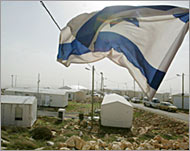Israeli lawmaker defends arms sales
Israeli arms sales to China have provoked a crisis in relations with the US but Tel Aviv must retain a measure of independence from its key ally, an influential deputy says.

The comments by Yuval Steinitz, chairman of the Israeli parliament’s foreign affairs and defence committee, came after the Pentagon confirmed on Monday that the Bush administration had raised concerns with Israel about its sales and transfer of military equipment and technology to China.
“There is a crisis. It has been going on for about a year, and to my great regret, even [Israeli Prime Minister Ariel] Sharon‘s visit to Washington didn’t resolve this crisis,” said Steinitz.
“There is no doubt that relationship with the United States is critical to Israel. But, with all the enormous importance of US diplomatic, economic and military help, Israel must keep its independence and also some reciprocity in this relationship,” he said in an interview with army radio.
Sanctions
Two months ago, Washington imposed sanctions on Israel‘s defence industry after a controversial weapons deal in which Israel was to upgrade a consignment of drones it had sold to China.
The deal provoked US anger and raised concerns that advanced American defence technology contained in Israeli equipment could be used against Taiwan.
|
“With China, Israel must continue to cooperate, but it must also continue to show sensitivity to the fears and the needs of the Americans” Yuval Steinitz, chairman of the Israeli parliament’s foreign affairs and defence committee |
Washington has since barred the Israeli defence industry from involvement in key military development projects and has frozen the transfer of sophisticated technological equipment to its Middle Eastern ally, the Israeli media reported.
Steinitz said it was important to create a mechanism that would ensure both Israel and the United States gave due consideration to the other when considering weapons sales to potential military enemies.
Cooperation
“With China, Israel must continue to cooperate, but it must also continue to show sensitivity to the fears and the needs of the Americans,” Steinitz added.
Israeli media reports have also suggested that US pressure could end up forcing the defence ministry’s director-general, Amos Yaron, to step down, with the Maariv daily reporting on Tuesday that his replacement had already been selected.
But Steinitz hit out at pressure for top defence officials to stand down over the affair.
“This is an illegitimate demand which also has an aspect of humiliation to it,” he said. “We cannot agree to everything.”
Israel intelligence
Meanwhile, Israel on Tuesday denied allegations it was engaged in any kind of intelligence gathering in the US after the indictment of a Pentagon analyst on charges of passing classified information to a pro-Israel lobby group.
 |
|
Israel has denied any role in |
“The question is: Is Israel carrying out intelligence-gathering in the United States? The answer is: Absolutely not,” said Labour MP Efraim Sneh, who leads the parliamentary subcommittee for security affairs.
“Israel meticulously abstains from all intelligence-gathering in the United States. I am saying this unequivocally,” he said in an interview with army radio.
“This started as policy in the wake of the Pollard affair and everyone has rigorously stuck to this,” he added, referring to Jonathan Pollard, a Jewish American who was jailed for life in 1987 in the United States on charges of spying for Israel.
Indictment
On Monday, a US court indicted Lawrence Franklin, who worked on the Pentagon’s Iran desk, on four counts of communicating national defence information to persons not entitled or authorised to receive it and on two counts of conspiracy.
According to the indictment, Franklin allegedly divulged classified information about an unnamed Middle Eastern country to two employees of a Washington lobbying firm, a foreign diplomat and another person associated with that country’s intelligence service.
The indictment gives no names other than Franklin‘s, but officials had previously identified the lobbying firm as the American Israel Public Affairs Committee.
The indictment did not say what country the diplomat was from. Israel denied any involvement in the case after Franklin‘s arrest in May.